Trading Day: ASX dragged lower by miners after Wall Street’s late dip
Stocks drop amid resources selloff, with Fortescue sinking, while plumber Reliance gained. Business conditions hit a two-year high.
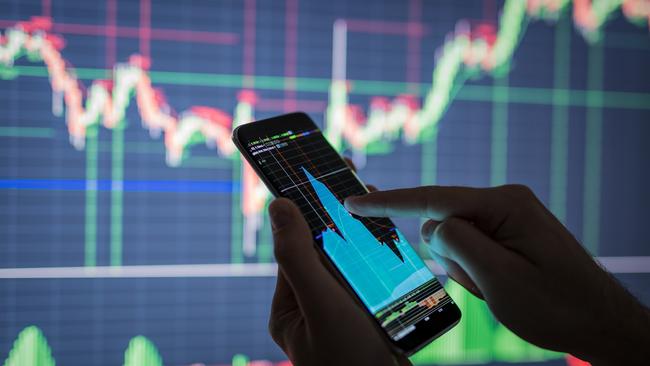
That’s all from the Trading Day blog for Wednesday, January 27. Australian stocks are down after Wall Street turned negative in late trade. The Dow fell 0.1 per cent, the S&P 500 lost 0.2 per cent and the Nasdaq edged down 0.1 per cent. Inflation and NAB confidence figures were released, a ruling was handed down Elaine Stead’s defamation action against Joe Aston, and former NAB staffer Rosemary Rogers was jailed for fraud.
Damon Kitney 7.02pm: Escala tips dividend comeback in 2021
Dividends from Australian listed companies will recover more strongly than earnings in the year ahead, while the private debt, private equity and unlisted infrastructure markets will prove fruitful for risk-adjusted returns, according to a leading adviser to the nation’s wealthiest people.
The $6bn boutique wealth management firm Escala Partners, chaired by former UBS and Citi equity capital markets doyen Brett Paton, says in its annual investment publication for clients, titled “Agenda 2021”, that small-cap companies, cyclical sectors and emerging markets — especially in Asia — would outperform in 2021.
The report, authored by Escala’s chief investment officer Tracey McNaughton, focuses on three key themes: the ongoing income challenge due to the low interest rate environment; COVID-19-driven structural changes in economies and the opportunities arising from these for investors; and the rise of ESG in investing.
“Perversely, we expect 2021 to be exceptionally strong. Economies and financial markets were taken to their extremes by an event that for the most part will be addressed by vaccine development. The global recession will be remembered as the deepest, but shortest recession on record,’’ Ms McNaughton writes in the report.
“With the health crisis now dealt with, economies can start to reopen again. This reopening will be supercharged by the sheer size of government stimulus and the fact that household and corporate balance sheets were for the most part insulated.”
But she added that while the volume of money in the global economy had surged in recent years, the speed of its circulation had collapsed.
“This has put downward pressure on inflation and hence interest rates. Growing income inequality is playing a role here. The upper strata of wealthy households spend a far smaller percentage of their income than the less wealthy,’’ she writes.
“An increase in inequality, therefore, correlates with a slower velocity of money. The very policies used to address the effects of the pandemic have led to a rise in inequality, contributing to a decline in velocity and stymieing inflation. As was the case following the GFC, policymakers protected Wall Street much better than they protected Main Street.”
Ben Wilmot 6.12pm: Real estate investment trusts face mixed outlook: Citi
Property funds managers are the pick of the A-REIT sector according to Citi analysts as their activities are being aided by very low interest rates and it expects further growth from Charter Hall, Goodman Group and Lendlease.
The broker also has a positive outlook on housing which it says is enjoying the benefits of significant stimulus.
But it warned that COVID-19 would drive substantial declines in market rent for retail and office property, which would be a multi-year headwind for landlords.
Citi believes that COVID-19 could trigger a structural change in demand for office space, with increased flexible working. It is now forecasting a more than 30 per cent decline in Sydney and Melbourne CBD market rents, based on past office cycles.
Citi expects a more than doubling of vacancy in Sydney and Melbourne this year and expects weak future demand. Asset values will be supported near term by low interest rates, but it is forecasting a 20 per cent decline in the medium term.
Retail remains structurally challenged and Citi said retail REITs face a difficult operating backdrop this year.
The analyst said consensus earnings forecasts and REIT book values both appear to embed assumptions that are quite optimistic, adding to the risk of an ongoing downgrade cycle. Offshore markets are also suffering and the broker is maintaining an underweight exposure to retail REITs.
By contrast, fund managers are benefiting as low interest rates are driving continued demand for income generating assets and there is strong growth in industrial and long leased asset values.
In 2020, fiscal stimulus provided a significant buffer for the residential market and now Citi sees growing evidence that monetary policy is taking over as the key driver.
The analyst found that homes were selling faster which suggests that residential market strength may be broadening, supporting a positive outlook for the residential market and developers.
6.04pm: Baillie Lodges snares Huka Lodge
Australia’s Baillie Lodges has snared New Zealand government approval to purchase the world famous luxury retreat, Huka Lodge, buying it with its Colorado-based private equity partner KSL Capital Partners in tow.
The purchase of the ultra luxury retreat in Taupo on New Zealand’s North Island is the second international lodge acquisition for the Baillie Lodges group which also recently snapped up Vancouver Island’s Clayoquot Wilderness Lodge.
The purchase of Huka Lodge, believed to have been negotiated at a price of more than $NZ50m ($46.7m), took more than one year to complete due to issues including winning New Zealand government approval through its Overseas Investment Office, which is similar to Australia’s Foreign Investment Review Board.
Past Huka Lodge guests include Queen Elizabeth II, Bill Gates, Joan Collins, the Spice Girls, Miuccia Prada and Dick Cheney.
Last night, Baillie Lodges co-founder James Baillie said he expected to spend more than $NZ5m upgrading Huka Lodge, which he said held an “incredible pedigree as the birthplace of luxury lodges.”
Mr Baillie said plans are afoot for a significant upgrade and enhancement of the 19-suite Huka Lodge’s main lodge, coupled with increasing the size of its dining and public spaces and creating a signature day spa and fitness facility.
5.30pm: Truth of iron ore demand weighs on $A: CBA
Commonwealth Bank’s Global Markets Research team notes that AUD/USD eased towards 0.7740.
“The stronger USD and concerns over the veracity of ongoing strong Chinese iron ore demand is weighing on AUD.
“Bloomberg reported that China’s Ministry of Industry and Information Technology reconfirmed numerous measures to help reduce steel output in China.
“The proposals include a medium‑term plan to reduce reliance on imported iron ore. Over 80pc of Australia’s iron ore exports are sent to China.”
Locally, Australian Q4 20 CPI was stronger than consensus at 0.9%/yr (in line with CBA forecasts).
“We see no immediate implications from the stronger result, with inflation still running well‑below target.
“We expect the RBA to retain its forecast in the February SMP for below target underlying inflation over 2021 and at least until mid‑2022.”
4.50pm: ASX ends -0.7% as resources dive
Profit taking in the resources stocks caused a bigger-than-expected fall in the Australian sharemarket on Wednesday.
The S&P/ASX 200 closed down 0.7pc at 6780.6 on volume almost 50pc above average, with the Energy sector down 3.4pc and the Materials sector down 3pc.
After closing at an 11-month high on Monday, the share market was hit by heavy selling after the Australia Day break.
The index fell steadily until the early afternoon at which point it was down 0.9pc at to four-day low of 6764.4,
Santos fell 4pc and Woodside lost 2.9pc even as WTI crude oil rose 0.6pc in APAC trading.
BHP fell 3.4pc, Fortescue Metals fell 6.4pc and Rio Tinto fell 3.9pc after a modest 2.6pc fall in the spot iron ore price overnight.
The selloff came despite a 0.5pc rise in the NASDAQ with Microsoft shares up 3.8pc in afterhours trading after a strong earnings report.
Apple, Tesla and Facebook are reporting after the US close today. The FOMC outcome is due at 6.00am AEDT.
Banks were mixed after Macquarie raised its bank sector earnings estimates, although Westpac and ANZ lost ground.
Outperforming sectors included Tech, Staples, Utilities, Discretionary and Financials, with CBA up 1.6pc, Wesfarmers up 1.7pc, Woolworths up 1.6pc, Afterpay up 1.8pc and ResMed up 2.4pc.
CSL mostly recovered from a 1.7pc intraday fall to a 3-day low of $270.82 that followed a downgrade to Neutral by JPM due to worries about its plasma collection.
Reliance Worldwide finished up 6.6pc after rising as much as 12 per cent to a 10-week high of $4.59 on a strong trading update.
Stronger-than-expected NAB business survey and official CPI data had no impact on the sharemarket.
Eli Greenblat 4.25pm: Eagers trading update exceeds guidance
Eagers Automotive, the nation’s largest car dealer formerly known as AP Eagers, has provided a trading update to the market in the lead up to profit season, that includes the car retailer’s first full year of trading for the enlarged company following the transformative $2 billion merger with Automotive Holdings Group.
The company said it expects to report an underlying operating profit before tax from continuing operations of $209.4 million for 2020 for calendar 2020, compared with $100.4m for the prior corresponding period. This exceeds the profit guidance range given in December 2020 of between $195m to $205m for 2020. The improved profit result compared to guidance has been delivered by stronger underlying operating profit before tax for both the car and truck retailing businesses, the company said.
The final result will be released on February 24 following the completion of the external audit.
3.31pm: ASX starting to bounce towards close
Australia’s share market is starting to bounce after a sustained selloff today.
The S&P/ASX 200 was down 0.7pc at 6679 in late trading after falling 0.9pc to a four-day low of 6764.3 in a steady selloff until the early afternoon.
A significant selloff in the Energy and Materials sectors continues to be partly offset by strength in the Technology, Consumer Staples, Discretionary and Financials sectors.
Heavy volume so far today puts in the index on track for daily turnover 47 per cent above the 20-day moving average.
Perry Williams 3.16pm: Woodside considers credit rating
Woodside Petroleum will meet with credit rating agency S&P over its balance sheet after the gas giant was placed on CreditWatch negative due to rising industry risks from a switch to renewables.
S&P lifted its risk assessment for oil producers to moderately high from intermediate citing concerns about the trajectory of demand for fossil fuels given an accelerating transition to clean energy alternatives to combat climate change.
Woodside’s BBB+ was placed on CreditWatch negative from BBB+ negative with its final rating to be finalised in the next few weeks along with a number of other big energy producers.
The Perth-based producer said it would engage with S&P ahead of the decision.
“We have a collaborative relationship with S&P. Our regular discussions with them focus on our prudent and proactive approach to capital management. We will continue to work with S&P in the coming weeks to address their views on potential impacts to our balance sheet. Woodside’s strategy is informed by the need to be successful through the energy transition,” a Woodside spokeswoman said in a statement.
Woodside said at its quarterly result it was confident it holds the financial firepower to push ahead with its $16bn Scarborough gas development this year, noting it was one of the few companies in the sector to hold on to its credit rating amid Covid and oil market volatility.
Woodside was down 3.3 per cent to $25.47 at 2.40pm AEDT.
1.29pm: NAB scores well in sustainability index
NAB scored highly in the 2021 Global 100 Most Sustainable Companies Index announced overnight at the World Economic Forum in Davos, Switzerland.
NAB was top ranked among Australian financial institutions in the index compiled annual by Corporate Knights.
The index ranks more than 8000 companies on clean revenues and investments that generate positive social or environmental impacts.
NAB also ranked fourth globally amongst financial peers and 44th across all industries in the world.
1.13pm: Home building costs surprise in CPI: Westpac
Westpac senior economist Justin Smirk says the main surprise in the December-quarter CPI data was how a surge in housing demand lifted dwelling prices so much that it swamped the benefit of the home builders grants.
“In many capital cities developers were able to lift prices in excess of the value of the grants, even in Perth and Hobart where the federal grant of $25,000 was supplemented by state government grants of $20,000,” Mr Smirk says.
“In our preview we had expected that the known rise in childcare would be offset by falling housing costs but rising underlying dwelling prices swamped the discounts.”
Prices fell by 0.3pc in Sydney, 0.5pc in Adelaide, 2.3pc in Darwin and 0.5pc in Canberra, but rose 0.9pc in Melbourne, 2pc in Brisbane, 2.2pc in Perth and 1.1pc in Hobart.
Mr Smirk says the large rise in Perth and Hobart is “somewhat surprising” given the lower level of house prices in those capital cities and the almost doubling of the size of the grants in those cities.
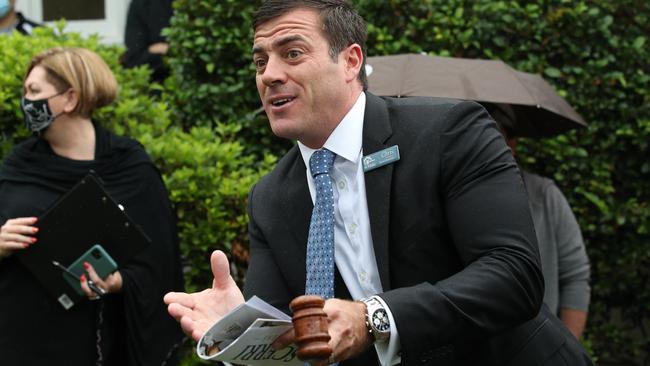
But while the CPI is still being influenced by government taxes and subsidies which have been “pushing and pulling” on the data, Mr Smirk says there’s little to suggest more broad based inflationary pressures outside of dwelling prices.
“Unlike the NZ CPI it was harder to find any broader inflationary pressures from the COVID induced changes in demand,” he says.
“Holiday travel costs did rise a bit more than expected but household contents were close to expectations while clothing fell more than expected.
“However, dwelling prices are running well ahead of our expectations and even rents have turned positive.
“These factors can have a meaningful impact on estimates of core inflation, something we will be looking more deeply at for our monthly update.”
Rents rose 0.1 per cent, which was stronger than an expected fall 0.3 per cent, while electricity prices fell 7.5 per cent due to a $600 household electricity credit in WA which saw electricity prices sink 66.7 per cent in Perth.
A 33.7 per cent rise in childcare - due to the ending of free child care in Victoria - and a 10.9 per cent lift in tobacco prices due to annual re-indexing of the tobacco excise in the CPI - were in line with expectations.
Bridget Carter 12.48pm: Luye prepares for potential hospitals IPO
Luye Medical is launching investor meetings for a potential initial public offering of the private hospitals within its Healthe Care business.
The part of the business on offer has been named Aurora Healthcare and investor meetings are being held on Thursday and Tuesday.
More to come.
12.43pm: ASX down 0.7pc amid resources selloff
A slump in the resources sector has driven an unexpectedly sharp fall in the Australian share market so far Wednesday.
The S&P/ASX 200 was down 0.7pc at 6777.2 after hitting a three-day low of 6772.3 even as NASDAQ futures rose 0.5pc, after Microsoft jumped in afterhours trading on a strong earnings report.
Resources stocks underperformed, with BHP down 3pc, Fortescue down 5.7pc and Rio Tinto down 3.3pc, and Woodside, Santos and Beach down at least 3pc.
The HealthCare sector was another significant drag on the market, with CSL down 1.1pc after J.P. Morgan downgrade, although ResMed rose 3pc..
Partly offsetting the selloff were gains in the Tech, Consumer Staples and Discretionary sectors, as well as some of the major banks.
Xero rose 5.1pc and Afterpay gained 2.2pc, while A2 Milk rose 3.8pc and Wesfarmers gained 1.2pc, and CBA rose 0.9pc.
Investors appeared to be switching from resources to banks after Macquarie upgraded NAB and raised its price targets for a number of the banks.
“Plus a lot of traders May be taking profits just in case iron ore continues to come back (down),” said Bell Potter’s Richard Coppleson.
Spot iron ore fell 2.6pc to $US164.65 a tonne overnight after hitting a 9-year high near $US180 a tonne last month.
David Ross 12.16pm: Former NAB staffer Rogers jailed
Rosemary Rogers, disgraced former chief of staff to NAB CEO Andrew Thorburn, has been sentenced to four years and nine months non-parole, as part of a maximum eight-year term, by a NSW court.
Rogers plead guilty in October last year to dozens of charges over $23.3m in illegitimate and inflated invoices submitted to NAB.
Rogers had been charged with more than 70 offences after it emerged she had engaged in a massive rort funnelling millions to herself and her alleged accomplice Helen Rosemond.
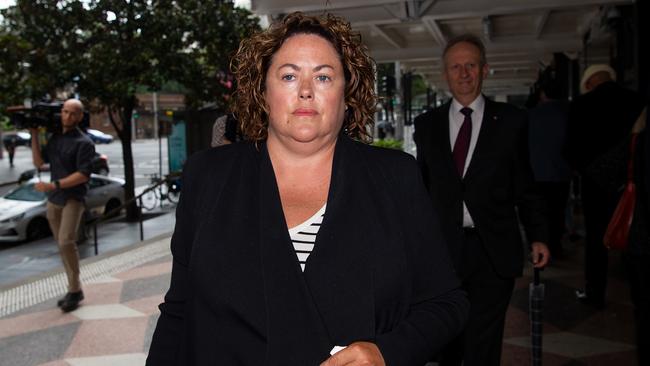
Cameron England 12.01pm: Stead awarded $280k in Aston defamation case
Former Blue Sky director Elaine Stead has been awarded $280,000 in damages in her defamation case against Financial Review columnist Joe Aston, who she argued, had made her out to be “reckless’’ and “stupid’’.
In a lengthy judgment delivered on Wednesday morning, Justice Michael Lee awarded Dr Stead $280,000 in ordinary and aggravated damages against Aston and his employer Nine Entertainment Co. relating to two columns and a tweet penned by Aston in 2019.
The cap for ordinary damages under Australian law is $421,000 while aggravated damages can be assessed in much greater sums above this, with regard to a number of factors.
Justice Lee said in his judgment there was scope under Australian law for the robust expression of opinions.
“In essence this case is about whether the line the law draws was crossed,’’ he says in his judgment.
Justice Lee said Dr Stead argued that Aston had “pole vaulted” the line the law draws in regard to defamation.
Nick Evans 11.48am: Iluka to repay JobKeeper
Iluka Resources says it will return $13.6m worth of JobKeeper payments after an upturn in the market for its core mineral sands products, joining Toyota and Super Retail Group in returning the cash assistance to the treasury.
While most Australian miners were able to power through the coronavirus crisis without government assistance, Iluka said it applied for JobKeeper payments to keep its workers employed as mineral sands markets crashed as the pandemic took hold, reducing both demand and the price of its products.
But a strong recovery in the second half of the year, Iluka said, meant it was in a position to return the cash voluntarily.
Iluka released its December quarter production report on Wednesday saying that, even though its total revenue for 2020 declined 25 per cent compared to the previous year, it still booked $841m in revenue, and free cash flow of $50m for the year, including the JobKeeper payments.
It produced 585,200 tonnes of zircon, rutile and synthetic rutile in 2020, down from 702,000 tonnes the year before.
But Iluka also highlighted the potential of its newly-launched rare earths business, saying it exported 44,400 tonnes of monazite concentrate recovered from tailings at its Eneabba operations.
While Iluka did not break out the revenue from rare earths directly it said it booked $106m in sales for its non-core products, including monazite and activated carbon, up 65 per cent from the previous year when it sold no rare earths products at all.
11.38am: CPI beats estimates
December quarter CPI data have beaten market expectations, in another sign of economic recovery.
Headline CPI Q/Q rose to 0.9pc, exceeding a 0.7pc rise expected by the market.
Headline figure fell to 0.9pc for quarter and rose to 0.9pc for year on year.
The trimmed mean CPI Q/Q rose to 0.4pc as expected from a downwardly-revised 0.3pc.
The trimmed mean CPI Y/Y remained at 1.2pc vs 1.1pc expected.
The weighted median CPI Q/Q rose to 0.5pc vs 0.4pc expected, from a downwardly-revised 0.2pc.
The weighted median CPI Y/Y rose to 1.4pc vs 1.2pc expected from a downwardly-revised 1.2pc.
AUD/USD rose from 0.7755 to 0.7764 before returning to 0.7755.
Bridget Carter 11.35am: Best & Less on show ahead of float
Best and Less Group is launching a product presentation and store tour next week ahead of its plans to list on the Australian Securities Exchange.
The company has hired investment bank Macquarie Capital for the float and held investor education meetings late last year for the business, which is owned by Allegro Funds Management.
The understanding is that it is hoping to sell for about $400m.
As part of the tour and presentations on Tuesday and Wednesday, investors will learn about the company’s products, supply chain and retail operations from members of the company’s senior management, including chief executive Rod Orrock.
The product presentation at Macquarie’s offices in Sydney’s Martin Place will tell investors about its distribution centre and online fulfilment centre, explain about product sourcing and quality and offer an overview of its baby, kids and women’s products.
The bus tours will take prospective investors to its stores at Blacktown Westpoint Shopping Centre and Warringah Mall.
The Best & Less Group is made up of brands that include Best & Less and Postie in New Zealand.
Chaired by former Just Group boss Jason Murray, discount clothing and household linens chain was purchased by Allegro Funds Management in 2019 from the local arm of Steinhoff International, Greenlit Brands.
Its annual earnings before interest, tax, depreciation and amortisation is understood to be about $55m.
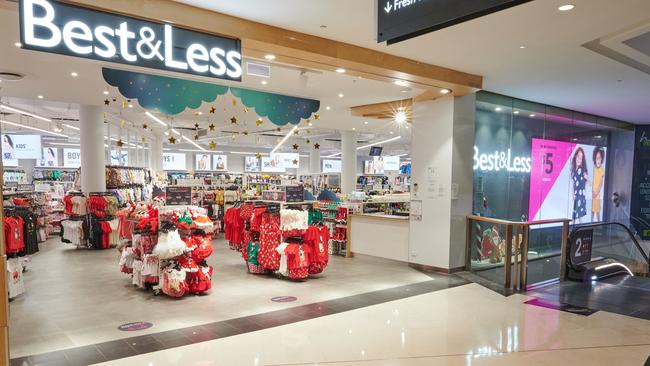
11.30am: Business conditions jump, confidence slips: NAB
Business conditions surged to a more than two-year high in December while confidence fell back amid the COVID-19 outbreak in Sydney, according to NAB’s Monthly Business Survey.
In its fourth consecutive monthly improvement, business conditions rose to 14 points - the highest since late August 2018 - from a downwardly-revised seven points in November.
Business confidence hit a two-month low of four points from a downwardly-revised 13 points in November.
Encouragingly, employment conditions are back in positive territory for the first time since the start of the pandemic,” says NAB chief economist, Alan Oster.
“Business conditions are now well above average, suggesting there is strong momentum in Australia’s economic recovery.”
He says falls in confidence in NSW, VIC and QLD are likely to partly reflects the impact of the Sydney COVID-19 outbreak through December.
Elsewhere, capacity utilisation saw further gains and is now around its long-run average and pre-virus levels, while forward orders retreated but remain in positive territory.
“These leading indicators suggest the pipeline of work continues to build - pointing to an ongoing recovery in the months ahead,” Mr Oster says.
“Most indicators within the survey are now broadly at or above pre-virus levels, with the exceptions being export conditions – no surprise given the pandemic continues to disrupt global trade – and capital expenditure.
“That said, capex has been recovering since reaching a trough in mid-2020 and, should conditions remain elevated, will likely turn positive again as businesses renew investment plans, especially given government tax incentives in place.”
11.12am: ASX down 0.5pc, iron ore miners dive
Australia’s S&P/ASX 200 share index fell 0.5pc to a 3-day low of 6790.6 as iron ore miners dived.
Fortescue Metals fell 7.4pc to $23.43, Rio Tinto fell 4.1pc to $116.to and BHP fell 3.1pc to $45.19.
The selloff extended to diversified miners with OZ Minerals down 5.5pc, Mineral Resources down 4pc and South32 down 3.3pc.
The Energy sector was also hit with Beach down 5.6pc and Woodside, Santos down over 3pc.
Investors seem to be switching from banks, with CBA up 1.6pc and NAB up 0.8pc after upgrades from Macquarie.
The major iron ore miners are due to report their earnings for the recent half year next month.
Their share prices hit record highs earlier this month as the spot iron ore price remained buoyant after hitting a 9-year high last month.
11.02am: Upside risk to CPI data?
December quarter CPI data are due for release at 11.30am (AEDT).
Headline CPI Q/Q is expected to fall to 0.7pc from 1.6pc in the September quarter and CPI Y/Y is expected to remain at 0.7pc, according to Bloomberg.
For the underlying CPI measures, the trimmed mean is expected to remain at 0.4pc Q/Q and slip one point to 1.1pc Y/Y, and the weighted median is expected to rise one point to 0.4pc Q/Q and slip one point to 1.2pc Y/Y.
But NAB economists see a higher-than-expected headline CPI of 0.9pc Q/Q. If so, the Australian dollar is likely to react positively.
They note that there’s greater than usual uncertainty this quarter given widespread anecdotes of price increases, while housing costs could fall with unit rents falling in Sydney/Melbourne and the government’s HomeBuilder grant being treated as a price decline for new dwelling costs.
“Major drivers of the rise are the ending of the childcare subsidy which is estimated to add 0.3 percentage points to the quarter, as well as the usual tobacco excise increase,” they say.
“Excluding these two components inflation remains relatively subdued and we forecast the core Trimmed Mean measure at 0.4pc q/q and 1.1pc y/y.
“Our forecast of Trimmed Mean inflation is unlikely to shift the RBA’s view on inflation with the November SoMP having core inflation below the 2-3 per cent target band in all three scenarios.
“Nevertheless, the RBA will need to upwardly revise their forecasts for the economy given the earlier and stronger than expected rebound seen in the economy in H2 2020 and the earlier fall in unemployment.
“Inflation forecasts thus should shift towards the RBA’s upside scenario, though we note inflation in the current upside scenario is below target.”
11.00am: Booktopia booms in online shopping shift
Newly-listed online retailer Booktopia Group said it experienced the strongest December in its 16-year history, with approximately 728,000 units shipped during the month and 4.2 million units shipped in the December half, up from three million units in the June half.
The Booktopia profit update said: “The increase in trading volumes compared to the previous year are consistent with other online retailers and a continuation of the shift towards online shopping experienced throughout 2020.”
Booktopia said it had a 52 per cent increase in revenue to $113 million, up from $74.5 million in the first half. It also reported a 506 per cent increase in EBITDA (adjusted for IPO costs) to $8 million, up from $1.3 million in the June half.
“Booktopia continued to experience strong demand for its products throughout the Christmas period with the recent investment in additional automation and the increased capacity of its distribution centre providing the foundation for a record month and a record half year,” Booktopia said.
“The board and management are cognisant of the ongoing uncertainty around further COVID-19 lockdowns and the success of the vaccine rollout, both in Australia and internationally,” the company said.
The company will release its full audited results for the six months to December 31 on
February 22.
10.30am: ASX slips after Wall Street’s dip
Australia’s share market slipped in early trading as the Materials, Energy and Health Care sectors fell.
The S&P/ASX 200 fell 0.2pc to 6809.9 despite a 0.2pc rise in S&P 500 futures, as Microsoft jumped after reporting after the US close.
The biggest drags included BHP down 2.5pc, Fortescue down 5.6pc, Rio Tinto down 3.4pc, CSL down 1pc and Woodside down 2.8pc.
Other notable decliners included BlueScope, Iluka, Beach, OZ Minerals and Sonic Health Care with falls of 3.7-5.2pc.
Declines were partly offset by gains in banks, with NAB up 1pc and CBA up 0.9pc after Macquarie upgraded NAB and raised its target prices for banks.
Also on the positive side, Reliance Worldwide rose 10pc after reporting a 13pc rise in first-half sales.
10.22am: Goldman CEO takes $US10m pay cut for 1MDB scandal
Goldman Sachs Group slashed Chief Executive David Solomon’s 2020 pay by 36pc, punishment for the bank’s admission last year that it broke U.S. laws in its dealings with an investment fund at the heart of a global corruption ring.
Mr Solomon received a $US17.5 million compensation package for 2020, down from the $US27.5 million he got for 2019, according to a securities filing.
In October, Goldman agreed to pay nearly $US3 billion to government officials in four countries to end an investigation into work it performed for 1MDB, a Malaysian fund that prosecutors had alleged was used to pay bribes to politicians in Malaysia and the Middle East. The bank said at the time that it would claw back or withhold a total of $US174 million in compensation from current and former executives.
Mr. Solomon’s 2020 pay would have been $US10 million higher, but for the actions the board took in response to the 1MDB saga.
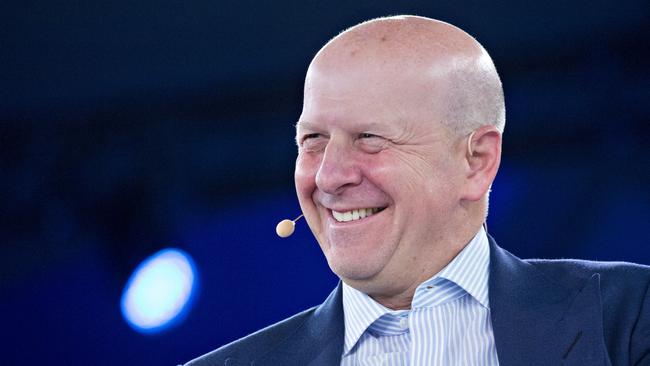
Dow Jones Newswires
10.12am: Weak plasma collections to hit CSL: JPM
JPM analyst David Low has cut CSL to Neutral and trimmed his target price to $293.70 after warning that weak plasma collections due to COVID-19 “threaten to disrupt FY22 earnings.”
“The rapid rise in COVID-19 cases across the US has seen the recovery in plasma collections falter, raising the risk of a larger-than-expected shortage of immunoglobulin in coming months,” he says.
“We had expected the shortfall would be offset by running down inventories, but this is looking increasingly unlikely.
We see downside risk to FY22 estimates, even though the plasma issue is almost certainly a short-term challenge that will resolve as vaccines are rolled out.”
CSL shares have fallen 0.9pc to last $273.25 in early trading.
10.10am: ANZ names acting replacement for CFO Jablko
ANZ says Shane Buggle has been appointed acting chief financial officer, after CFO Michelle Jablko was poached in December by Transurban.
It says Ms Jablko will transition her duties over the coming months to Mr Buggle, currently
group general manager internal audit.
Mr Buggle will take over as acting CFO from February 8. Ms Jablko will remain an employee of ANZ until March 26.
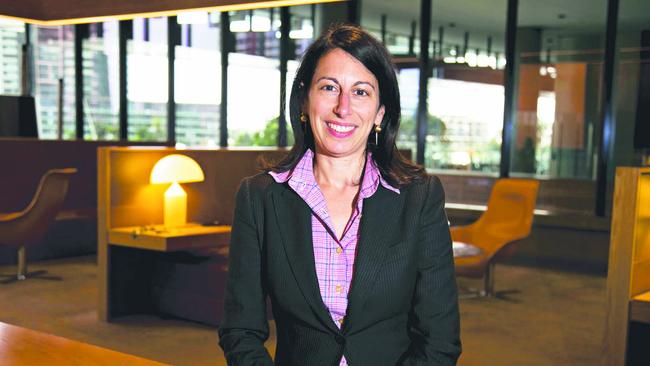
9.43am: ASX may buck slightly weak leads
Australia’s share market may buck slightly weak offshore leads after Microsoft shares jumped in afterhours trading after a stronger-than-expected report.
Overnight SPI 200 futures fell 0.3pc as the S&P 500 slipped 0.2pc amid COVID worries and potential obstacles for proposed US fiscal stimulus.
Before Tuesday’s Australia Day holiday, the S&P/ASX 200 rose 0.4pc to an 11-month high close of 6824.7.
BHP ADR’s equivalent close overnight at $36.34 was 0.6pc below Monday’s local session close for BHP, with iron ore down 2.6pc to $US164.65 a tonne.
Focus turns to NAB’s December Business Survey and ABS 4Q CPI data at 1130 AEDT.
The FOMC statement is due at 6am (AEDT) tomorrow and Apple, Tesla and Facebook are due to report after the US close.
9.30am: Beach Energy output drops
Beach Energy said its second-quarter oil and gas production fell by 8pc compared to the first three months of fiscal 2021, mainly due to the shutdown of the Otway Gas Plant in November for maintenance.
Beach reported quarterly production of 6.2 million barrels of oil equivalent. Output was down 3pc on year.
Beach said the Otway Gas Plant shutdown also affected second-quarter sales revenue, which fell by 5pc to $344 million.
“The achievement of FID on Waitsia Stage 2 just before Christmas was a significant milestone, as it makes Beach Australia’s newest player in the global LNG market,” said Managing Director Matt Kay. “Beach expects to commence marketing of LNG at an opportune time, where customers are likely to value reliable supply from high quality de-risked projects, as north Asia markets experience supply constraints during the current northern winter season.”
Dow Jones Newswires
9.16am: Oil Search production rises 4pc
Oil Search said its annual oil and natural gas production rose by 4pc in 2020, led by a record output rate at the Exxon Mobil Corp-operated PNG LNG facility in Papua New Guinea.
Oil Search reported annual output of 29.02 million barrels of oil equivalent in 2020. Fourth-quarter output of 7.06 million BOE contributed to sales revenue of $US259.5 million, up 37pc on the previous three months.
“Despite the material challenges of 2020, PNG LNG continued to outperform in the fourth quarter, ending the year with its highest ever annual production of 8.8 million tonnes,” said managing director Keiran Wulff. “The North West Moran oil field was also brought back online during the quarter following a shut-in due to the 2018 earthquake.”
Oil Search said it was able to sustain cost reductions made after the coronavirus pandemic worsened and oil prices tumbled on competition between Saudi Arabia and Russia for market share. Unit production costs for 2020 were within full-year guidance of $US9.50 - $US10.50/BOE, management said.
Oil Search added that its net debt fell by 20 per cent in 2020, and it had total liquidity of US$US1.44 billion at the end of December, including $US541 million in cash.
Dow Jones Newswires
Lachlan Moffet Gray 9.05am: Home renos lift Reliance sales
Plumbing and heating fixtures company Reliance Worldwide’s net sales increased by 13 per cent to $642m in the first half of the financial year, as enthusiasm for home improvement increased in markets across the world.
The sales lift means the company is forecasting earnings before interest, tax, depreciation and amortisation to be in the range of $164m-$167m, up at least 30 per cent on the first half of FY2020.
Net sales growth was 16 per cent in the Americas, 10 per cent in the Asia Pacific and 9 per cent in Europe, the Middle East and Africa.
CEO Heath Sharp said as well as increased sales, average margin had also increased across all markets.
“EBITDA margins have increased as a result of the strong operational leverage driven by higher volumes, and each region is expected to report strong margin expansion for the period,” he said. “Despite the challenges presented by the COVID‐19 pandemic, we have kept all our manufacturing facilities operating and our focus on execution has enabled us to meet the increased demand we have seen across our markets.”
The company’s strong cash generation also means it was able to reduce net debt by $76m to, with leverage falling from 1.57 to 0.88 as of December 31.
9.00am: AstraZeneca’s Soriot quits CSL board to avoid conflict
Pharma giant CSL says Pascal Soriot has resigned from the board, with the decision mutually agreed between the company and the CEO of AstraZeneca.
“(Soriot) has resigned to avoid any potential future conflict of strategic interest between CSL and AstraZeneca that may arise due to the acquisition of Alexion by AstraZeneca,” CSL said.
The acquisition, announced on December 12, is subject to a number of closing conditions that have not yet been satisfied.
“Whilst Pascal has only served for a short time as a Non-Executive Director of CSL, he made a strong contribution and become a valued member of the Board,” CSL’s chair, Brian McNamee said.
CSL and AstraZeneca also have a deal for CSL to manufacture the UK-listed company’s COVID-19 vaccine in Australia.
“CSL is regretful that Pascal’s tenure has come to an early close. We look forward to maintaining our ongoing relationship as CSL continues to work closely with AstraZeneca on the critically important COVID-19 vaccine project for the benefit of Australians,” Mr McNamee said.
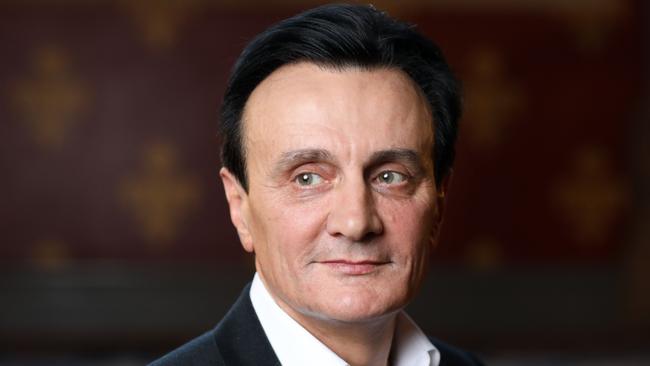
Lachlan Moffet Gray 8.50am: Atlas hit by toll road slowdown
International toll road operator Atlas Arteria has seen road traffic and toll revenue remain subdued on its French, German and US assets in the fourth quarter, as a second wave of COVID-19 hits the Northern Hemisphere.
The APRR road network in the east of France saw traffic fall 24.8 per cent in the fourth quarter against the previous comparable period, culminating in a 21 per cent decline in traffic in the year to December 31 2020.
Revenue declined 17.1 per cent over that same year, from €2.5 billion to €2.1 billion.
The ADELAC commuter network between Annecy and Geneva saw traffic decline by 28.6 per cent over the year following a 33 per cent decline in the fourth quarter.
Revenue declined 27 per cent over the year to €41.36m.
In the US the traffic on the Dulles Greenway in Northern Virginia was “significantly impacted” by lockdown measures with a 42.2 per cent traffic decline in the fourth quarter.
It brings the total annual decline in traffic to 42.7 per cent while revenue fell 42.3 per cent to $US61.77m.
The performance of the Warnow tunnel in Germany was comparatively stronger, with traffic falling just 14.2 per cent in the fourth quarter.
Annual toll revenue fell 6.5 per cent to €12.72m while annual traffic fell by just 7.7 per cent.
8.45am: Asaleo rejects takeover, lifts revenue
Personal care and hygiene company Asaleo Care has rejected a takeover offer from Essity, saying it undervalues the company and is “materially inadequate”.
It comes as Asaleo released a trading update, saying it was posting “growth momentum in a challenging market”.
Full-year revenues of $419.2m were, up 2.3 per cent, it said. Underlying EBITDA of $87.2m was higher than previous guidance of upper end of $84-$87m.
Asaleo said it was targeting 5-7pc revenue growth and EBITDA of $90m - $93m in full-year 2021.
8.36am: Starbucks sales improve despite Covid
Starbucks Corp. said its sales are recovering, particularly in China, but that store closures in places where COVID-19 case counts are high continue to weigh on the company.
The company also said Chief Operating Officer Roz Brewer is leaving the company giant at the end of February to lead another publicly traded company. Starbucks declined to identify the company that had hired her.
The coffee giant said Tuesday that global same-store sales fell 5pc in its quarter ended in December from the same period a year earlier. A quarter earlier, sales by that measure fell 9pc from a year earlier. Same-store sales in China increased 5pc year over year in the latest quarter.
Starbucks is still navigating restrictions imposed by local officials seeking to curb the new coronavirus’s spread. Sales of $US6.7 billion during the quarter were down 5pc from the year-ago period, with Starbucks attributing the decline to fewer customers, reduced hours and store closures related to the pandemic. Analysts polled by FactSet anticipated $US6.9 billion in sales.
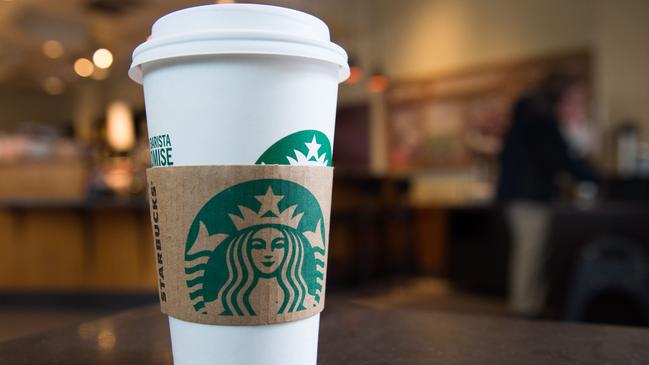
Dow Jones
8.31am: What’s impressing analysts today?
BWP Trust started at Underweight: $3.65 target price: MS
CSL cut to Neutral: JPM
Charter Hall Long WALE REIT started at Overweight: MS
Corporate Travel raised to Outperform: CS
Credit Corp cut to Hold: Canaccord
Harvey Norman raised to Overweight: MS
Nickel Mines cut to Hold: Shaw
Rhipe started at Buy: $2.20 target price: Jefferies
Webjet raised to Outperform: CS
NAB raised to Neutral; target price raised 9pc to $24: Macquarie
CBA target price raised 8.3pc to $78: Underperform rating kept: Macquarie
Westpac target price raised 7pc to $23: Outperform rating kept: Macquarie
Bendigo Bank target price raised 13pc to $9: Neutral rating kept: Macquarie
Bank of Queensland target price raised 15pc to $7.50: Underperform rating kept: Macquarie
Tabcorp target price raised 22pc to $4.40; Neutral rating kept: Citi
ASX raised to Equalweight: MS
8.28am: Biden to move on oil, gas leasing
The oil industry is emerging as a primary target of President Biden’s climate policy, setting the stage for a confrontation that could shape the future of the energy sector.
The President is expected to issue an executive order that would suspend new oil and gas leasing on federal land, people familiar with the matter say, in what is widely seen as a first step toward fulfilling Mr Biden’s campaign pledge to stop drilling on federal lands and offshore.
Drilling on federal lands accounts for roughly 9 per cent of US onshore production, but oil industry leaders see a curtailment on future development as a significant threat. Oil companies want to maximise their access to land and federal permits to help grow and sustain operations, and they plan to resist Mr Biden’s efforts through lawsuits and lobbying Congress.
“The early actions of the administration are unilaterally shutting down and restricting the ability of American oil and gas producers to run their operations,” said Anne Bradbury, chief executive of the American Exploration and Production Council, which represents independent US oil companies. “The scope and the lack of consultation with industry stakeholders has been alarming.”
In addition to a possible ban on new leases, Mr. Biden issued orders on his first day in office last week for a wide-ranging review of policies that former President Donald Trump had intended to ease restrictions on oil and other industry.
Dow Jones
8.25am: Microsoft earnings jump on gaming, cloud
Microsoft Corp posted record quarterly sales underpinned by pandemic-fuelled demand for videogaming and accelerated adoption of its cloud-computing services.
The software giant said fiscal second-quarter net income rose more than 30 per cent to $US15.5 billion. Sales advanced 17 per cent to $US43.1 billion. Wall Street expected sales of $US40.2 billion and net income of $US12.6 billion, according to FactSet.
The remote work era has been a boon for Microsoft. In addition to its videogaming and cloud-computing products, the company has seen strong sales for its Surface laptops as people bought devices to work remotely and enable distance learning. And use of Microsoft’s Teams workplace collaboration software that includes text chat and videoconferencing, and has been a priority for Chief Executive Satya Nadella, has jumped during the pandemic. Microsoft shares have risen more than 37 per cent over the past year.
“What we have witnessed over the past year is the dawn of a second wave of digital transformation sweeping every company and every industry,” Mr. Nadella said.
Microsoft shares rose as much as 6.6pc to a record high of $US247.70 in afterhours trading, after a reporting 2Q EPS of $US2.03 vs $US1.64 expected.
US futures may therefore see some strength before earnings reports today from Apple, Tesla and Facebook.
MSFT last up 3.9pc at $232.33.

Dow Jones
8.20am: ASX set for weaker start
Australian stocks are poised to open lower, even as Wall Street turned positive to extend its rally.
Shortly after 8am (AEDT) the SPI futures index was down 22 points, or 0.3 per cent.
The Australian dollar is higher at US77.50.
Spot iron ore has sunk 2.3 per cent to $US164.65 a tonne, Brent oil edged up 0.1 per cent to $US55.91 a barrel, and gold futures lost 0.2 per cent to $US1850.9 an ounce.
8.10am: Wall Street in late slip
US stocks slipped, failing to extend their rally after major indexes hit records a day earlier and investors readied for a slew of blue-chip earnings.
The S&P 500 retreated 0.2 per cent after hitting a new intraday record in the morning of 3870.90. The technology-focused Nasdaq Composite edged down 0.1 per cent. The Dow Jones Industrial Average was fell 0.1 per cent, or 22 points.
This week marks the height of earnings season, with shares of General Electric rallying 2.7 per cent after the industrial conglomerate reported forecast-beating fourth-quarter revenue and free cash flow.
Johnson & Johnson rose 2.7 per cent after it recorded stronger sales in its latest quarter, as revenue gains from its pharmaceutical division boosted its top-line results. Raytheon Technologies jumped 1.4 per cent after the aerospace and defense company reported fourth-quarter profit and revenue that beat expectations.
Starbucks, Microsoft and Texas Instruments were to release results after markets closed. Major tech firms, including Apple, Tesla and Facebook, will update investors tomorrow.
Investors will watch to see if earnings can continue to top analysts’ expectations, providing a further catalyst to push markets higher.
“What’s working in the market’s favour is the overall trend of economic growth is still robust and that’s likely to translate to positive earnings,” said Shoqat Bunglawala, head of multiasset solutions, international, at Goldman Sachs Asset Management. “There’s an expectation that there’s going to be more robust growth driven by pent up demand in the second half of the year.”
The Conference Board released its index Tuesday of consumer confidence, which showed US consumers’ outlook on the economy improved in January. Consumer confidence increased to 89.3 in January from 87.1 in December.
US home-price growth continued to accelerate toward the end of 2020, data showed. In the year to November, the S&P CoreLogic Case-Shiller National Home Price Index, which measures average home prices in major metropolitan areas, rose 9.5pc.
The pan-continental Stoxx Europe 600 rose 0.6pc. Shares of UBS Group rose 2.9pc after the Swiss bank announced a new buyback program of up to $US4.5 billion, having closed 2020 with a consensus-beating quarterly performance.
Dow Jones Newswires
7.50am: Synlait raises milk price forecast
Synlait Milk raised its milk price forecast for the current season, citing the strong increase in dairy commodity prices over recent months.
Synlait now expects a base milk price of $NZ7.20 per kilogram of milk solids for the 2020/2021 season, up from a prior forecast of $NZ6.40/kg.
“Despite the wider global uncertainty, dairy commodity prices have remained robust and a higher forecast base milk price will be welcomed by our Synlait farmer suppliers,” said David Williams, Synlait’s national milk supply manager.
Dow Jones Newswires
6.28am: US stocks turn higher, extending rally
US stocks edged up, extending their rally after major indexes hit records a day earlier and investors readied for a slew of blue-chip earnings.
The S&P 500 climbed 0.1 per cent after hitting a new intraday record at 3870.90. The technology-focused Nasdaq Composite edged up 0.2 per cent. The Dow Jones Industrial Average was also up 0.2 per cent.
This week marks the height of earnings season, with shares of General Electric rallying 4.7 per cent after the industrial conglomerate reported forecast-beating fourth-quarter revenue and free cash flow.
Johnson & Johnson rose 2.6 per cent after it recorded stronger sales in its latest quarter, as revenue gains from its pharmaceutical division boosted its top-line results. Raytheon Technologies jumped 3.3 per cent after the aerospace and defence company reported fourth-quarter profit and revenue that beat expectations.
Starbucks, Microsoft and Texas Instruments will release results after markets close. Major tech firms, including Apple, Tesla and Facebook, will update investors tomorrow.
Investors will watch to see if earnings can continue to top analysts’ expectations, providing a further catalyst to push markets higher.
“What’s working in the market’s favour is the overall trend of economic growth is still robust and that’s likely to translate to positive earnings,” said Shoqat Bunglawala, head of multiasset solutions, international, at Goldman Sachs Asset Management. “There’s an expectation that there’s going to be more robust growth driven by pent up demand in the second half of the year.”
The pan-continental Stoxx Europe 600 rose 0.6 per cent. Shares of UBS Group rose 2.9 per cent after the Swiss bank announced a new buyback program of up to $US4.5 billion, having closed 2020 with a consensus-beating quarterly performance.
Dow Jones Newswires
6.22am: Asia sales help LVMH limit Covid damage
LVMH, the world’s biggest luxury company, said a strong pick-up in Asian sales and robust online business helped contain the damage from COVID-19 in its 2020 results.
The outlook remained uncertain because of the global health crisis, but LVMH said it still entered 2021 with “cautious confidence” that it will be able to build on a strong fourth-quarter rebound.
Headline sales came in at 44.6 billion euros ($US54.2 billion), a drop of 17 per cent, and just a touch weaker than the 44.7 billion predicted by Factset, a financial data provider.
Net profit meanwhile fell by 34 per cent to 4.7 billion euros. “LVMH showed good resilience in 2020 in an economic environment severely disrupted by the serious health crisis that led to the suspension of international travel and the closure of the group’s stores and manufacturing sites in most countries over a period of several months,” a company statement said.
But in the fourth quarter, LVMH recorded a strong improvement in trends in all its activities.
AFP
6.20am: Champagne sales lose fizz to virus
Champagne sales plunged last year as coronavirus lockdowns stymied tourism and shut bars, hotels and restaurants, its trade association said.
Sales of the sparkling white wine fell by 18 per cent to 245 million bottles worldwide, said the Committee Champagne that includes producers and distributors said.
“It was a dark year, but we managed the crisis by limiting output ... and the end result is better than we feared in July,” said Jean-Marie Barillere, head of a union of champagne houses.
He estimated losses at around one billion euros ($US1.2 billion) less than in 2019, but cautioned that the numbers had not yet been finalised.
It was the first time in 50 years that exports fared better than domestic sales, Barillere added.
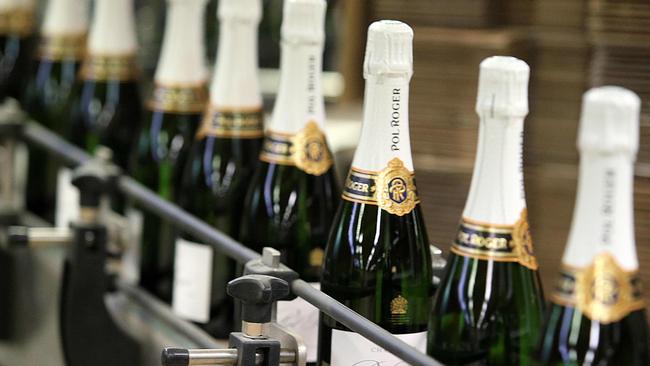
AFP
6.15am: BlackRock pushes companies on climate
The head of the world’s largest asset manager BlackRock has called for companies to explain how they plan to reduce their net greenhouse gas emissions by 2050.
“I believe that the pandemic has presented such an existential crisis -- such a stark reminder of our fragility -- that it has driven us to confront the global threat of climate change more forcefully and to consider how, like the pandemic, it will alter our lives,” Larry Fink wrote in his annual letter to chief executives.
“We are asking companies to disclose a plan for how their business model will be compatible with a net zero economy,” said Fink, whose firm manages nearly $8.7 trillion of assets on behalf of pension funds, sovereign wealth funds, local authorities and wealthy investors.
Referring to recent climate-related disasters like “fires, droughts, flooding and hurricanes,” Fink noted that energy companies have already taken “billions in climate-related writedowns on stranded assets and regulators focus on climate risk in the global financial system.”
AFP
6.10am: European stocks bounce back
European stocks rebounded but Wall Street trod water as traders tracked developments on the coronavirus pandemic and US stimulus plan.
Meanwhile, investors welcomed the International Monetary Fund revising its global growth forecast higher.
“Stock markets were already driving higher this morning and the bullish move was given extra help by the IMF, who lifted their expectations for the world growth,” said market analyst David Madden at CMC Markets UK.
The IMF said the global economy is expected to see a strong rebound this year, but the coronavirus crisis is causing severe damage, slashings tens of trillions of dollars off GDP.
Optimism that new vaccines will bring the pandemic under control and allow economic activity to resume, coupled with stimulus in major economies, has allowed the IMF to boost its global growth forecast this year by two percentage points to 5.5 per cent.
Investors have been on a buying spree since November, when Biden won the presidency and vaccinations began to be authorised, with additional support coming from central banks’ loose monetary policy and massive government spending.
But while the general feeling is of optimism about the long-term outlook, confidence is being tested by the pandemic, its rising death toll, new lockdowns and problems in rolling out inoculations.
The biggest driver of the market rally in recent weeks has been hope for Biden’s $US1.9 trillion economic rescue plan.
But there is a growing concern that it could be whittled down in congressional negotiations, with Republicans and even some Democrats concerned about its size in the wake of a $US900 billion deal passed at the end of last month.
In Europe, London closed up 0.2 per cent, Frankfurt jumped 1.7 per cent and Paris gained 0.9 per cent.
Asian traders were in a selling mood, with Hong Kong and Shanghai suffering big losses after the People’s Bank of China tightened liquidity in mainland financial markets.
AFP
6.08am: US consumers mired in Covid gloom
US consumers are pessimistic about the state of the economy as it weathers the COVID-19 pandemic’s tough winter months, but see things getting better soon, a survey said.
The Conference Board reported its January consumer confidence index was at 89.3, increasing slightly more than expected from its 87.1 level in December.
“Consumers’ appraisal of present-day conditions weakened further in January, with COVID-19 still the major suppressor,” The Conference Board’s Senior Director of Economic Indicators Lynn Franco said.
“Consumers’ expectations for the economy and jobs, however, advanced further, suggesting that consumers foresee conditions improving in the not-too-distant future.” The present situation index measuring consumers’ views on current business and employment conditions fell about three points to 84.4, but their views on the economy’s future rose 5.5 points to 92.5.
Consumers gave few positive reviews of the current economy, with only a small improvement in those describing business conditions as “good” while those saying they were “bad” rose more than three percentage points to 42.8 per cent.
There was also a slight decline in people saying jobs were “plentiful,” but those describing employment as “hard to get” rose to 23.8 per cent, almost a full point.
AFP
6.06am: Pandemic to slash $US22tr off global GDP 2020-25: IMF
The global economy is expected to see a strong rebound this year but the coronavirus crisis is causing severe damage, IMF chief economist Gita Gopinath said.
“Now at $22 trillion, the projected cumulative output loss over 2020 to 2025, relative to the pre-pandemic projected levels remains substantial,” Gopinath told reporters.
AFP
6.04am: Global economy stronger, but uncertainty high: IMF
Optimism that new vaccines will bring the pandemic under control and allow economic activity to resume, coupled with stimulus in major economies, has boosted the growth forecast this year to 5.5 per cent, the IMF said.
However, the Washington-based crisis lender warned the outlook is beset by “extraordinary uncertainty,” and governments will need to continue to act to prevent lasting damage after COVID-19 caused the worst peacetime economic crisis since the Great Depression.
The upgrade in growth after the 3.5 per cent worldwide contraction in 2020 reflects “expectations of a vaccine-powered strengthening of activity later in the year and additional policy support in a few large economies,” including the United States and Japan, the IMF said in its latest World Economic Outlook (WEO).
Those developments create “a stronger starting point for the 2021-22 global outlook than envisaged in the previous forecast.” However, “much remains to be done on the health and economic policy fronts to limit persistent damage from the severe contraction of 2020 and ensure a sustained recovery.” Surging infections in some countries -- including new COVID-19 variants -- that led to renewed lockdowns, as well as logistical problems with vaccine distribution, pose “important counterpoints to the favourable news,” the report said.
And even with the growth, many economies will not recover to their pre-pandemic levels this year, the IMF said.
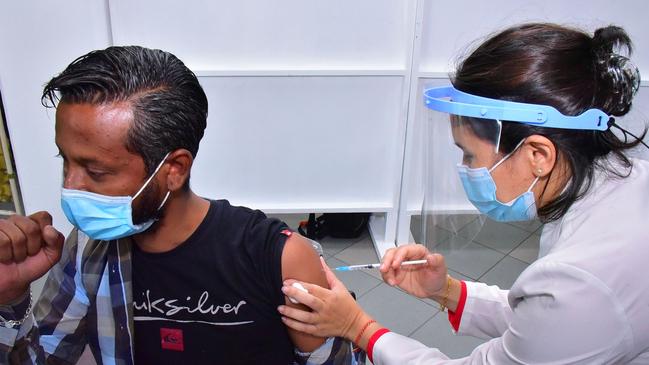
AFP
6.00am: Global growth to rebound 5.5pc in 2021: IMF
Optimism that new vaccines will bring the pandemic under control and allow economic activity to resume coupled with stimulus in major economies has boosted the growth forecast this year to 5.5 per cent, the IMF said.
“These developments indicate a stronger starting point for the 2021-22 global outlook,” the IMF said in its latest World Economic Outlook (WEO).
The fund expects growth in the United States to be a full two points higher than previously projected at 5.5 per cent, its strongest rate since 1984, while the IMF forecasts China growing 8.8 per cent.
But the Washington-based crisis lender warned the outlook is beset by “extraordinary uncertainty” and more action is needed to prevent lasting damage.
AFP
5.55am: General Electric upbeat on 2021
General Electric scored higher fourth-quarter orders in key industrial segments as it reported a profitable 2020 and eyes further improvement in 2021, according to results.
The industrial giant, which has been in turnaround mode following losses the prior three years, projected a jump in adjusted profit margins in 2021 on anticipated improvement in the macroeconomy with widespread use of coronavirus vaccines.
“Over the past year our team proved resilient, and momentum is growing across our businesses,” Chief Executive Lawrence Culp said.
“We are in leading positions to capture opportunities in the energy transition, precision health, and the future of flight.” In the fourth quarter, GE reported $2.4 billion in profits, more than four times the level in the year-ago period, reflecting the benefits of cost-cutting initiatives.
Revenues fell 14 per cent to $US22.1 billion.
GE reported earnings of $US5.2 billion for all of 2020, compared with a loss of $US5.4 billion the prior year.
AFP
5.50am: EU invites US to work on big tech regulation
European Commission President Ursula von der Leyen urged the United States under President Joe Biden to work with Brussels on regulating the tech giants.
“Together, we could create a digital economy rule book that is valid worldwide: from data protection and privacy to the security of critical infrastructure,” she said in a videolink address to the World Economic Forum.
“A body of rules based on our values: Human rights and pluralism, inclusion and the protection of privacy.” The EU in December unveiled landmark draft legislation aimed at curbing the power of the internet behemoths that could shake up the way Silicon Valley can operate in the 27-nation bloc.
The move comes as big tech companies are facing increasing scrutiny around the globe, including in the United States, where Google and Facebook are facing antitrust suits.
Regulators worldwide are pushing to rein in the ability of firms to dominate markets and are pushing to make them more accountable for content published online.
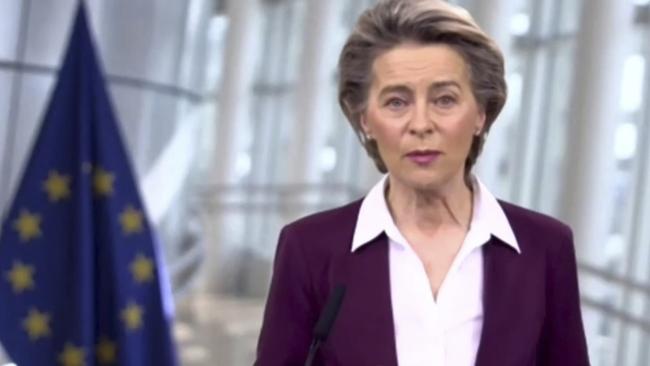
AFP




To join the conversation, please log in. Don't have an account? Register
Join the conversation, you are commenting as Logout